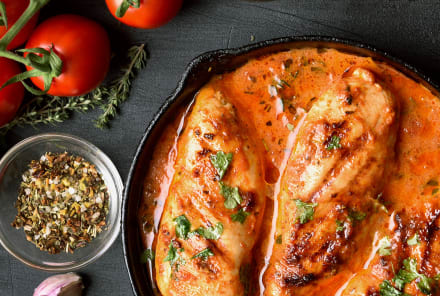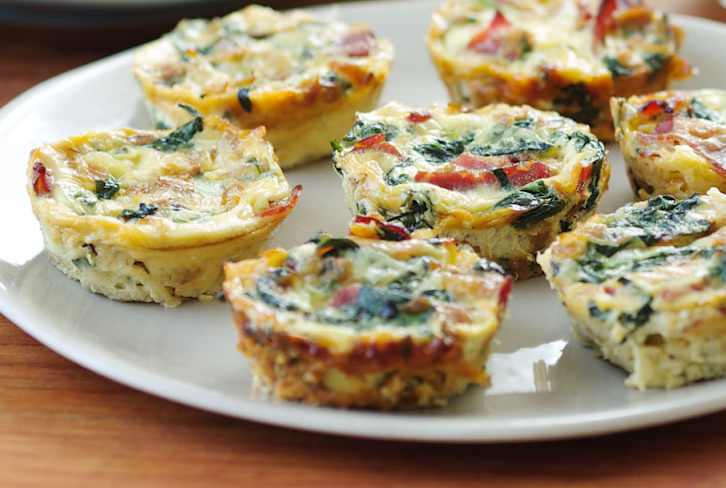Advertisement
Trying To Keep Inflammation Levels Down? Exactly How Much Sugar, Caffeine & Alcohol You Can Get Away With

Inflammation underscores so much of what we cover here at mbg—it’s the root cause of not only preventable diseases but also gut dysfunction that many of us experience daily. So, for the next 10 days, we’re doing a deep dive into inflammation, giving you everything you need to know: the basics of what inflammation is, how to know if you have it, and what you can do to control it. Follow along here, and to learn even more, check out our FREE Functional Nutrition Webinar with Vincent Pedre, M.D.
Occasionally a patient will ask me whether having a few glasses of red wine or their morning coffee can contribute to chronic inflammation, a culprit for nearly every disease1 on the planet.
Or they'll wonder whether having a piece of birthday cake at their friend's party will affect their inflammatory levels. Everyone wants to have their cake and eat it, too—literally!
As a medical doctor who specializes in functional medicine and gut health, I see how chronic inflammation affects the gut but eventually becomes systemic, affecting nearly every organ in the body. While numerous factors drive inflammation, some of the biggest culprits are the foods and drinks we consume every day.
Some of my patients start their day with stimulants (caffeine) and end with relaxants (the foods they’re addicted to or glass of wine or beer every night).
While numerous factors drive inflammation, some of the biggest culprits are the foods and drinks we consume every day.
They repeat this cycle because it gets them through the day, and they believe it helps them cope with stress. They also consume more sugar than they realize, often in sneaky sources like sweetened almond milk in their dairy-free lattes or store-bought tomato sauce.
All of these things have a cumulative effect on chronic inflammatory conditions. But how much of an effect? Let’s look at how three major players affect inflammation: sugar, caffeine, and alcohol.
How sugar affects inflammation.
Let's start with the big one. Sugar is the king of inflammation2, inflicting a massive blow to your gut and overall health.
This low-grade inflammation contributes to the development of numerous age-related chronic conditions2 including nonalcoholic fatty liver disease (NAFLD), type 2 diabetes, and cardiovascular disease that may lead to a heart attack.
Sugar also contributes to obesity, characterized by a chronic low-grade inflammation3 in fatty tissues as well as systemically. With obese people, we see an increased immune response within fat tissue that researchers call metabolic inflammation3.
Sugar, especially added sugar in processed food, can also result in insulin resistance4. In this condition, your pancreas works on overdrive, secreting ever higher amounts of insulin because your cells have become resistant to "hearing" this hormone signal.
Insulin resistance can lead to metabolic syndrome, a major cause of heart and vascular disease, and diabetes—all major causes of health problems that can destroy your quality of life. Insulin resistance also perpetuates the vicious cycle of inflammation. Chronic inflammation, in turn, fuels insulin resistance5. Once it gets kicked off by excess sugar and processed carbs in the diet, it's hard to shut off.
Many of my patients know the usual suspects for sugar. That piece of birthday cake isn't going to do their gut or their overall health any favors, and they know to keep it to the occasional indulgence (if at all).
More problematic are the so-called healthy sugars in foods like agave-sweetened cookies, almond and other nut milks, and even fruit.
'Large amounts of fructose4, even from healthy foods like fruit, can create or exacerbate insulin resistance and inflammation. (This article can help you determine the right amount of fruit sugar for your condition.)
Insulin resistance doesn't exist in a vacuum; it also leads to other imbalances that fuel the inflammatory fires. Take leptin, a very important hormone that regulates your feeling of fullness. The more leptin in circulation, the less hungry you should be.
However, the brains of people who are obese do not respond to the leptin signal. Their levels are high, but these levels are not sensed by their brain to signal that they are full and they should stop eating. That leads to another problem—leptin resistance—leaving you hungry when you've already had all the food you need for fuel.
Too much sugar leads to insulin resistance, which leads to leptin resistance, resulting in weight gain—all of which increase inflammation.
All carbohydrates convert to sugar in your body. Some convert more quickly than others. If you eat a food containing gluten (such as pasta) and you have a sensitivity to that food, that will only add more fuel to your inflammatory levels.
Want to dial down inflammation? Start with sugar, in all its many forms.
So how much sugar can you get away with and stay low in inflammation? Aim for a max daily intake of refined sugar of 25 grams or less.
How caffeine affects inflammation.

Research shows coffee can have pro- or anti-inflammatory effects6, depending on the individual.
I see this in my own practice: Some patients do fine on three or four cups of black coffee in the morning, while others get jittery on even a few cups of green tea. Everyone responds differently. Knowing your body means tuning in to the signals it gives you. If you feel jittery after two cups of coffee, then dial back down to one cup once daily. It all depends on whether you are a slow metabolizer or fast metabolizer.
For myself, I'm a slow metabolizer, so one cup of coffee will leave me feeling jittery for hours. As a result, I decided to give up coffee altogether and instead drink tea for caffeine because of its more measured, tempered effect. Now don't get me wrong, I did love the taste of coffee, but I value an internal sense of calm more than the accelerated fuel coffee can offer.
How you drink caffeine matters, too. If you're pouring sugar or sugar-laden nondairy creamers into a hulking cup of coffee every morning, your body is going to respond much differently than someone having a cup of black organic coffee with MCT oil. It's what you add to your cup of coffee that can fuel the fires of inflammation.
Why you need or want caffeine is also important. If getting moving in the morning requires multiple cups of something caffeinated (coffee, tea, or anything caffeinated), I would encourage you to look at your sleep habits, stress management, and how you're expending your energy levels. If your caffeine habit is excessive, it's time to look at your lifestyle habits and move toward greater balance between activity and rest.
Caffeine can also be dehydrating, so I encourage patients to stay ahead of their hydration. Drink at least 64 fluid ounces of clean, filtered water daily, or even more depending on your caffeine habit.
So, how much caffeine is too much? It's safe to say that less than 50 grams of caffeine, found in a typical 12-ounce cup of coffee or green tea, is a safe bet. More than 150 grams (easily seen in a 20-ounce cup of coffee) will push your insulin secretion, leading to all the problems we talked about before, including increasing your cravings for sugar and refined carbohydrates. Yes, drinking too much coffee can actually lead to weight gain!
How alcohol affects inflammation.
According to the Dietary Guidelines for Americans, moderate alcohol consumption is up to one drink per day for women and up to two drinks per day for men. However, even this is too high when we look at the research. And many people are drinking more than that.
Size matters too. A serving size7 is a 12-ounce beer, 5-ounce glass of wine, or a 1.5-ounce shot of liquor. Some people generously fill their wineglass (16 to 18 ounces) and consider it one glass.
Some research shows that light to moderate alcohol consumption can have anti-inflammatory benefits8. However, large amounts of alcohol can create intestinal inflammation9 through multiple pathways.
A vicious cycle ensues as the inflammatory response exacerbates alcohol-induced organ damage, affecting your gut but also other organs, like the liver.
How your body responds to alcohol depends on several factors. Enjoying a glass of organic red wine will have a completely different impact than drinking a margarita or other sugary alcohol concoctions (a surefire way to rev up inflammation, by the way, based on everything I noted in the above section about sugar).
Some people also enjoy a glass of dry red wine as their dessert. For others, a glass becomes two, and before they know it, they're devouring a second piece of pie. In other words, know how alcohol makes you behave, as it disinhibits your brain control centers and will lead you to overindulge in the other contributors to inflammation.
Like caffeine, alcohol can be dehydrating. Be especially mindful to drink sufficient water when you're drinking. Certain situations like drinking while flying can be even more dehydrating, potentially exacerbating inflammation.
So, how much alcohol can you get away with without causing too much inflammation? Stick to one drink three times a week or less to enjoy your cup while keeping the tides of inflammation low. And for your long-term health, it's better to be an intermittent non-binge-drinker than a regular drinker.
Let's face it—a warm brew, a glass of red wine, and an occasional pastry are all life's little pleasures. Consumed mindfully and in a low-stress environment, they will minimally affect inflammation and can even be anti-inflammatory. Treating these as luxuries to enjoy in moderation allows you to indulge, while managing inflammation and keeping your cells young.

Dr. Vincent M. Pedre, medical director of Pedre Integrative Health and president of Dr. Pedre Wellness, is a board-certified internist in private practice in New York City since 2004. His philosophy and practices are a blend of both Western and Eastern medical traditions. He is a clinical instructor in medicine at the Mount Sinai School of Medicine and is certified in yoga and medical acupuncture. His unique methodology is best described as integrative or defined by a functional, systems-based approach to health. With his holistic understanding of both sides of the equation, he can help each patient choose the best course of action for their ailments to provide both immediate and long-term relief. His holistic approach incorporates positive, preventive health and wellness lifestyle choices. Dr. Pedre Wellness is a growing wellness platform offering health-enhancing programs along with informative social media and lifestyle products, such as dietary supplements, books, and weight-loss programs.

Dr. Vincent M. Pedre, medical director of Pedre Integrative Health and president of Dr. Pedre Wellness, is a board-certified internist in private practice in New York City since 2004. His philosophy and practices are a blend of both Western and Eastern medical traditions. He is a clinical instructor in medicine at the Mount Sinai School of Medicine and is certified in yoga and medical acupuncture. His unique methodology is best described as integrative or defined by a functional, systems-based approach to health. With his holistic understanding of both sides of the equation, he can help each patient choose the best course of action for their ailments to provide both immediate and long-term relief. His holistic approach incorporates positive, preventive health and wellness lifestyle choices. Dr. Pedre Wellness is a growing wellness platform offering health-enhancing programs along with informative social media and lifestyle products, such as dietary supplements, books, and weight-loss programs.
9 Sources
- https://www.ncbi.nlm.nih.gov/pmc/articles/PMC3492709/
- https://www.ncbi.nlm.nih.gov/pmc/articles/PMC4579563/
- https://www.ncbi.nlm.nih.gov/pmc/articles/PMC4784686/
- https://www.ncbi.nlm.nih.gov/pmc/articles/PMC5174139/
- https://www.ncbi.nlm.nih.gov/pmc/articles/PMC2246086/
- https://www.ncbi.nlm.nih.gov/pubmed/27425673
- https://www.cdc.gov/alcohol/faqs.htm
- https://www.ncbi.nlm.nih.gov/pubmed/18372583
- https://www.ncbi.nlm.nih.gov/pmc/articles/PMC5513683/
Watch Next
Enjoy some of our favorite clips from classes
Enjoy some of our favorite clips from classes
What Is Meditation?
Mindfulness/Spirituality | Light Watkins
Box Breathing
Mindfulness/Spirituality | Gwen Dittmar
What Breathwork Can Address
Mindfulness/Spirituality | Gwen Dittmar
The 8 Limbs of Yoga - What is Asana?
Yoga | Caley Alyssa
Two Standing Postures to Open Up Tight Hips
Yoga | Caley Alyssa
How Plants Can Optimize Athletic Performance
Nutrition | Rich Roll
What to Eat Before a Workout
Nutrition | Rich Roll
How Ayurveda Helps Us Navigate Modern Life
Nutrition | Sahara Rose
Messages About Love & Relationships
Love & Relationships | Esther Perel
Love Languages
Love & Relationships | Esther Perel












